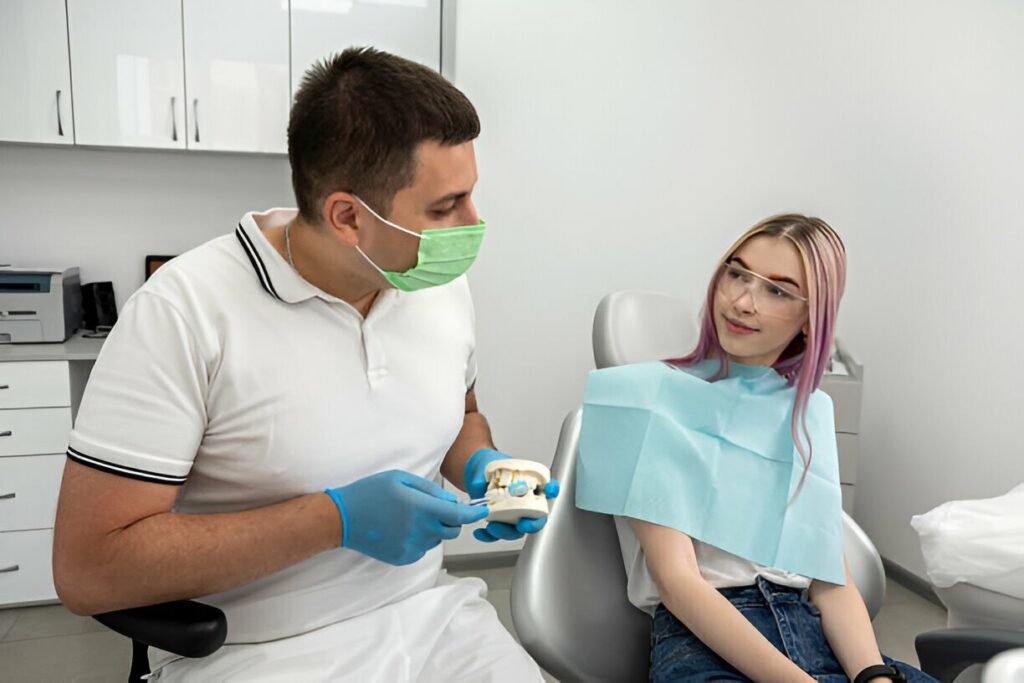Peri-implantitis is a condition that affects dental implants. It is similar to gum disease but occurs around the implant site. Dentists treat this condition to save the implant and keep your mouth healthy. This article will cover the causes, symptoms, and treatment for peri-implantitis.
What Is Peri-Implantitis?
Peri-implantitis is an infection that occurs around a dental implant. It affects the gums and the bone supporting the implant. If left untreated, it can lead to the loss of the implant. Poor oral hygiene often causes this. It lets bacteria build up around the implant. Other factors like smoking, diabetes, and a history of gum disease can also increase the risk.
Symptoms of Peri-Implantitis
Early detection of peri-implantitis is crucial. Look out for these symptoms:
- Red or swollen gums
- Bleeding when brushing or flossing
- Pain around the implant
- Pus around the implant
- Receding gums
- Loose implant
If you notice any of these signs, visit your dentist immediately.
Diagnosing Peri-Implantitis
To diagnose peri-implantitis, your dentist will examine your mouth and take X-rays. These X-rays help to see the bone loss around the implant. The dentist will also check for pockets around the implant where bacteria can hide. This thorough exam helps find how bad the infection is. It also helps plan the treatment.
Treatment Options
Treating peri-implantitis involves several steps. The goal is to remove the infection and save the implant. Here are the common treatment options:
Non-Surgical Treatments
- Professional Cleaning: The dentist will clean around the implant. They will remove plaque and tartar. This cleaning goes deeper than regular brushing and flossing.
- Antibiotics: To fight the infection, the dentist may prescribe antibiotics. These can be in the form of pills, mouth rinses, or gels applied directly to the affected area.
- Laser Therapy: Laser therapy is a modern approach to treating peri-implantitis. The laser targets and removes infected tissue while preserving healthy tissue. It also helps to disinfect the area and promote healing.
Surgical Treatments
If non-surgical treatments are not enough, surgical options may be necessary:
- Flap Surgery: Flap Surgery involves lifting the gums. This is done to clean the area around the implant thoroughly. The dentist removes the infected tissue. They smooth the bone surface to help the gums reattach.
- Bone Grafting: In cases of significant bone loss, bone grafting may be needed. The dentist adds bone to the affected area. This supports the implant and grows new bone.
- Resective Surgery: This surgery aims to reshape the bone around the implant. The dentist removes some of the bone to make it easier to clean and maintain the area.
- Regenerative Procedures: Regenerative Procedures use special materials. They encourage bone and tissue growth. The dentist may use growth factors, membranes, or bone substitutes. These help to regenerate the lost bone and gum tissue.
Maintenance After Treatment
After treating peri-implantitis, maintaining good oral hygiene is essential. Here are some tips:
- Brush and Floss Daily: Use a soft-bristle toothbrush and fluoride toothpaste. Floss around the implant to remove any food particles and plaque.
- Use antimicrobial mouthwash: This can help reduce bacteria in your mouth and prevent infection.
- Regular Dental Check-ups: Visit your dentist regularly for check-ups and cleanings. They will monitor the health of your implant and catch any issues early.
- Quit Smoking: Smoking can increase the risk of peri-implantitis and affect healing. Quitting smoking will improve your overall oral health.
- Healthy Diet: Eat a balanced diet rich in vitamins and minerals. This helps to keep your gums and bones healthy.
Preventing Peri-Implantitis
Preventing peri-implantitis is better than treating it. Follow these steps to keep your implants healthy:
- Maintain excellent oral hygiene.
- Visit your dentist regularly.
- Avoid smoking and control other risk factors like diabetes.
- Follow your dentist’s aftercare instructions if you have an implant.
Conclusion
Peri-implantitis is a serious condition that can affect dental implants. Finding the problem early and treating it properly are crucial. They save the implant and keep the mouth healthy. Follow good oral hygiene and visit your dentist often. Doing so can prevent this issue and ensure your implants last a long time.
How Do You Know if Your Gums Are Strong Enough for Implants?
Visit Bridge St Aesthetic and Dental Implant Clinic
You have symptoms of peri-implantitis or concerns about your dental implants. Don’t wait. We provide complete care at Bridge St Aesthetic and Dental Implant Clinic. It addresses all your dental needs. Our team of experienced professionals is dedicated to helping you achieve and maintain optimal oral health.
Why Choose Us?
As the best NHS dentist in Aberdeen, we offer top-notch services and personalised care. Whether you need a routine check-up, treatment for peri-implantitis, or any other dental service, we are here to help. Our clinic uses the latest technology and methods. They ensure you receive the best care.
Schedule Your Appointment Today!
Don’t let peri-implantitis compromise your smile. Contact Bridge St Aesthetic and Dental Implant Clinic today to schedule your appointment. Let us help you keep your dental implants healthy and your smile bright. Call us now or visit our website to book your visit.
Get the best dental care from the top NHS dentist in Aberdeen. They are at Bridge St Aesthetic and Dental Implant Clinic. Your smile deserves the best!





